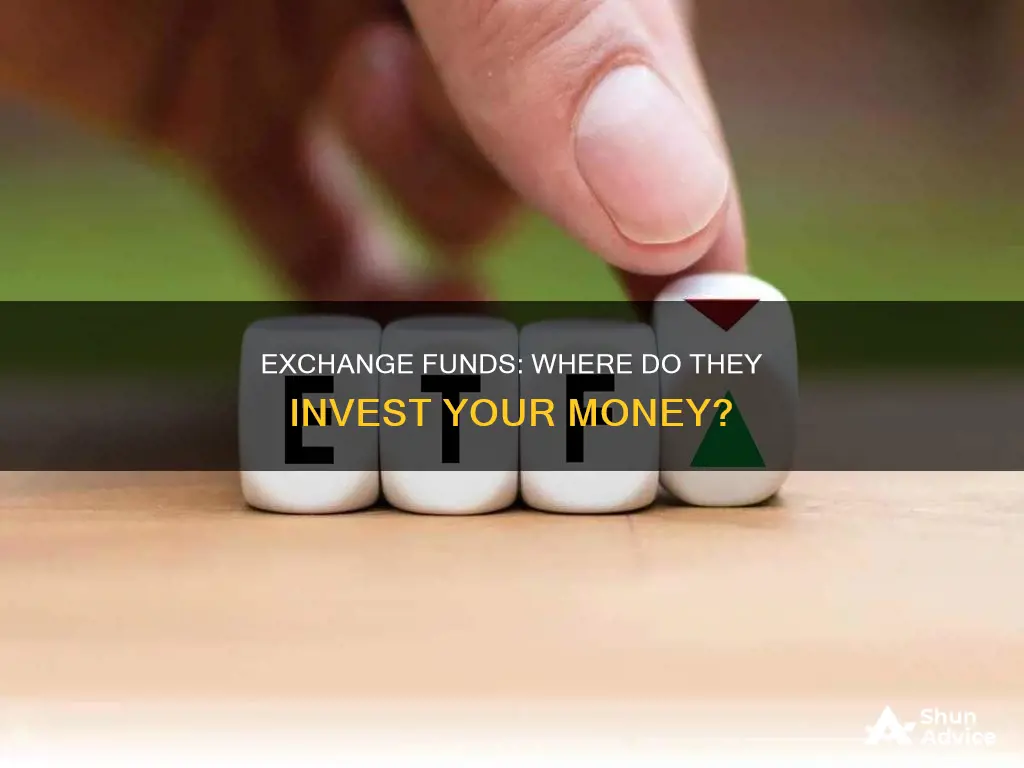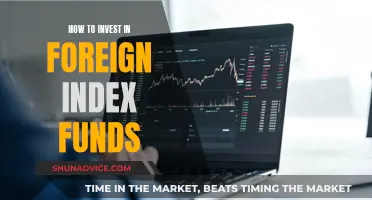
Exchange funds, also known as swap funds, are a type of private fund that allows investors to diversify their portfolios and reduce taxes. They are designed for long-term investors with concentrated stock positions, such as company executives or individuals who have inherited assets. By contributing their stock to the fund, investors receive ownership of a diversified portfolio of securities without triggering current tax consequences. Exchange funds typically require a minimum investment of $500,000 to $1 million and are only available to accredited or qualified investors. The funds are required to invest at least 20% of their portfolio holdings in qualifying assets, such as illiquid private real estate investments, to maintain their tax-exempt status. While exchange funds offer benefits such as diversification and tax deferral, they also carry risks, including equity market risk, liquidity restrictions, and high fees.
| Characteristics | Values |
|---|---|
| Purpose | To reduce the risk of a concentrated stock and diversify an investment portfolio |
| Function | Allows investors to exchange a concentrated stock position for a diversified basket of stocks of the same value |
| Tax | Deferral of taxes from capital gains |
| Investors | Executives and business owners, investors with heavily concentrated positions in stocks, investors with very large gains in a particular stock |
| Requirements | Minimum liquidity of $5 million cash to join and contribute, seven-year lock-up period |
| Investment | 20% minimum of total gross assets in illiquid qualifying investments such as commodities or real estate |
| Eligibility | Accredited investors with over $200,000 per year or $1 million in net worth |
What You'll Learn

Diversification of holdings
Exchange funds are a great way to diversify holdings in a portfolio. They are designed for investors with a large number of shares in a single company, allowing them to exchange these for a diversified portfolio of shares in multiple companies. This helps to reduce the risk of a portfolio being overly exposed to a single company's performance.
For example, a fund may be marketed toward executives and business owners who have amassed large holdings in one or a handful of companies. By participating in an exchange fund, they can diversify their concentrated positions.
The exchange fund pools together stocks from multiple shareholders to create a diversified collection of stocks. This is done in specific amounts to target a particular mix, such as mimicking a stock market index.
The benefit of this is that investors can reduce their risk by not having all their holdings in one company. They can also defer capital gains taxes by not selling their shares but instead exchanging them for shares in the fund.
Exchange funds are often structured to target a particular investment objective, like well-known market indexes. For example, the Cache Exchange Fund is designed to approximate the long-term performance of the Nasdaq-100 index.
It is important to note that exchange funds are not the same as exchange-traded funds (ETFs). ETFs are mutual fund-like securities that can be traded on stock exchanges, whereas exchange funds are private funds that are not traded on public exchanges.
Bond Index Funds: When to Invest and Why
You may want to see also

Deferral of capital gains taxes
Exchange funds are a private investment fund designed for long-term investors with concentrated stock positions to diversify their portfolio and reduce taxes. They are also known as swap funds.
One of the benefits of exchange funds is the deferral of capital gains taxes. Exchange funds allow investors to swap their concentrated holding of a stock for a professionally managed, diversified portfolio. This approach not only achieves a measure of diversification for the investor but also allows for the deferral of taxes.
Because an investor swaps shares with the fund, no sale actually occurs. This allows the investor to defer the payment of capital gains taxes until the fund's units are sold. There is a seven-year lock-up period to satisfy the tax deferral requirements.
In the US, the applicable federal individual income tax rates for calculating after-tax returns range from 15% to 33% for the years 1985 through 2001. The applicable federal corporate tax rates for calculating the impact of undistributed capital gains on after-tax returns range from 34% to 35% for the same period.
It is important to note that the information provided is based on current federal income tax laws, and future changes to tax laws may impact the tax consequences of investing in exchange funds.
Index Funds: Diversified Investment Options?
You may want to see also

Tax-efficiency
Exchange funds, also known as swap funds, are an arrangement between concentrated shareholders of different companies that pools shares and allows investors to exchange their large holdings of a single stock for units in the entire pool's portfolio. They are particularly appealing to concentrated shareholders who wish to diversify their otherwise restricted holdings. Exchange funds are not the same as exchange-traded funds (ETFs).
ETFs are considered more tax-efficient than mutual funds. This is because they tend to have fewer "taxable events" and fewer capital gains distributions, which means fewer opportunities for taxation. However, investors may need to pay taxes if the ETF holds dividend-paying stocks or interest-yielding bonds, even if they are holding the ETF for the long term.
There are four main reasons why ETFs are considered tax-efficient:
- Low Portfolio Turnover: ETFs tend to have low turnover, which can reduce the realized gains that need to be distributed.
- More Long-Term Capital Gains: Low turnover often means a longer holding period for each of the underlying investments. ETFs generally hold underlying securities longer than 12 months, which usually qualifies any gains that are realized for favourable long-term capital gains tax rates.
- Secondary Market Transactions: When ETF investors sell their shares on the stock exchange to other investors, the ETF portfolio manager does not need to buy or sell any of the ETF's underlying investments. As such, one ETF investor's sell decision has no impact on other investors, helping to keep capital gains distributions low.
- Primary Market Transactions: ETFs have a unique creation and redemption mechanism that allows authorised participants to build or disassemble baskets of ETF shares when demand increases or decreases. These transactions are typically conducted in-kind, meaning securities are exchanged for ETF shares rather than cash, and they do not trigger a taxable event for the fund.
There are also some tax advantages to exchange funds. They allow investors to diversify their holdings while deferring taxes from capital gains. Because an investor swaps shares with the fund, no sale actually occurs, and the payment of capital gains taxes can be deferred until the fund's units are sold. Exchange funds are designed to appeal to investors who have previously focused on building concentrated positions on restricted or highly appreciated stock but who are now looking to diversify.
Mutual Funds: Best International Investment Opportunities
You may want to see also

Long-term investment
Exchange funds are a type of private investment fund designed for long-term investors with concentrated stock holdings who want to diversify their portfolio and reduce taxes. They are particularly beneficial for executives holding a substantial amount of their employer's stock, individuals who have inherited assets from a family business, or investors with very large gains in a specific stock.
Here's how exchange funds work for long-term investment:
Diversification
Exchange funds allow investors to swap their concentrated holdings of a single stock for a professionally managed, diversified portfolio of securities. This diversification helps to reduce risk and volatility in their investment portfolio. By pooling shares from multiple investors, exchange funds provide participants with ownership of a wider range of stocks, thus reducing the impact of any single stock on their overall investment portfolio.
Tax Benefits
One of the key advantages of exchange funds is their ability to defer taxes. When investors contribute their concentrated stock to the fund, they do not trigger any current tax consequences. Instead, taxes are deferred until the fund's units are sold or redeemed. Additionally, contributions of appreciated stock to an exchange fund are generally not taxable under current federal tax laws, further minimizing the tax burden on investors.
Long-Term Returns
Investors using exchange funds seek to achieve long-term, after-tax returns that track the overall market performance, as measured by indexes like the S&P 500. By diversifying their holdings and minimizing taxes, exchange funds offer the potential for greater portfolio appreciation over time. This makes them attractive to long-term investors who are willing to hold their investments for extended periods.
Real Estate Investments
Exchange funds typically invest a significant portion of their assets in illiquid private real estate investments, such as multi-family residential, office, or industrial properties. These real estate investments provide a stable source of income and can enhance the overall performance of the fund over the long term.
Lock-up Period and Liquidity Restrictions
It's important to note that exchange funds usually have a seven-year lock-up period to satisfy tax deferral requirements. During this period, investors may face restrictions on liquidity, and early redemptions may be subject to penalties. However, after the seven-year period, investors can redeem their shares, typically receiving a diversified basket of liquid securities selected by the fund manager.
In summary, exchange funds offer long-term investors a way to diversify their concentrated stock holdings, minimize taxes, and potentially achieve solid long-term returns by investing in a diversified portfolio that includes stocks and private real estate investments.
Launching a Hedge Fund: A Teen's Guide to Investing
You may want to see also

Reduced concentration risk
A concentrated position refers to having a significant portion of your overall portfolio allocated to one single investment, typically a particular stock. Usually, once a single stock position reaches 10% or more of your portfolio, its risk begins to intensify.
Using an exchange fund can be one way to reduce your risk, providing protection in case a significant investment ends up performing poorly. An exchange fund allows you to substitute or replace a concentrated stock position with a diversified basket of stocks of the same value, reducing portfolio risk and putting off tax consequences until later.
Company executives may end up heavily invested in their employer's stock. Some companies may require senior managers to have a certain percentage of stock ownership to align their interests with that of the company. Even without a shareholding requirement, key employees' portfolios can become concentrated in their company's stock through employee equity compensation benefits, such as stock options or RSUs.
Instead of having to sell shares to diversify your portfolio and pay out the associated capital gains taxes, which can be hefty, employing an exchange fund could be a potential solution. Even restricted stocks are sometimes eligible for exchange funds.
An exchange fund aggregates the concentrated stock positions of many investors, creating a diversified collection of stocks that mimics an underlying, broad-based stock market index. You can swap your concentrated position for a partnership interest or share of the exchange fund, avoiding a taxable event and providing you with tax-deferred growth instead.
The main reason to use an exchange fund is for diversification. Spreading your investment dollars across a wide range of assets can help you reduce volatility and investment risk, so that no one asset has an outsized impact on your overall investment portfolio. An exchange fund helps you replace a concentrated position with a diversified one.
Moving out of a concentrated position may also improve your returns over time. While past performance is no guarantee of future returns, an analysis of the stocks in the Nasdaq-100 index found that almost three-quarters of the stocks in the index underperformed the index over a 22-year span, and that 44% of those stocks actually lost money over that time period. On a risk-adjusted basis, very few stocks outperform the Nasdaq consistently.
Exchange funds are a type of private fund that can give you tax-efficient diversification by avoiding the “sell” part of the sell-and-diversify strategy. To achieve this goal, an exchange fund pools together stocks from multiple shareholders in specific amounts to target a particular mix – like a stock market index.
Since you exchange your stock for fund shares, you (and all the other investors) are diversified by virtue of participation. After a seven-year curing period, you can withdraw a diversified basket of stocks from the fund. The current tax code treats contributions to – and redemptions from – qualifying exchange funds as non-taxable. That means you can diversify your concentrated position without suffering tax drag. Instead, your taxes are deferred until you decide to sell the assets you’ve withdrawn from the fund, and the cost basis from your original stock carries over.
Exchange funds are for sophisticated investors with a concentrated stock position and a long-term time horizon for their investments.
Key Considerations for Investing in Algorithmic Trading Funds
You may want to see also
Frequently asked questions
An exchange fund, also known as a swap fund, is an arrangement between concentrated shareholders of different companies that pools shares and allows an investor to exchange their large holding of a single stock for units in the entire pool's portfolio. Exchange funds are designed for long-term investors with concentrated stock positions who want to diversify their portfolio and reduce taxes.
Exchange funds pool large amounts of concentrated shareholders of different companies into a single investment pool. Several investors pool their shares into a partnership, and each receives a pro-rata share of the exchange fund. Now the investor owns a share of a fund that contains a portfolio of different stocks, allowing for diversification. Because an investor swaps shares with the fund, no sale actually occurs, allowing for the deferral of taxes.
To invest in an exchange fund, investors may be required to qualify as an accredited investor or a qualified purchaser. There may be minimum liquidity requirements of $5 million cash to join and contribute. Exchange funds will also typically have a seven-year lock-up period to satisfy tax deferral requirements.







